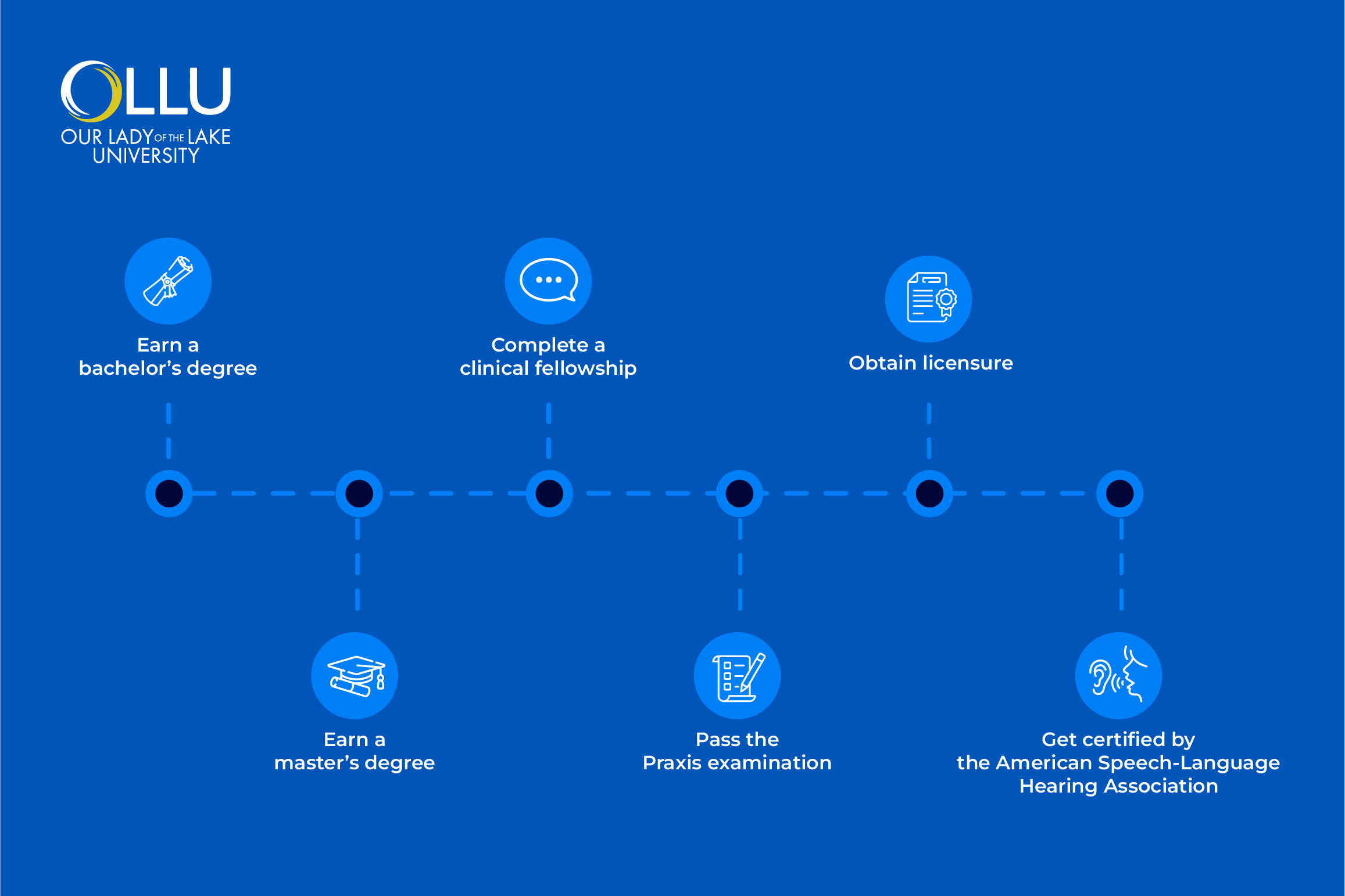6 Steps on How to Become a Speech Pathologist
May 25, 2024

Speech pathology, also referred to as speech-language pathology, is a pivotal field focused on aiding individuals in overcoming communication and swallowing disorders. Through comprehensive assessment, diagnosis, and intervention, speech pathologists help people of all ages enhance their speech, language, and swallowing abilities.
This rewarding career offers the satisfaction of making a profound difference in individuals' lives and presents promising prospects, given the increasing demand for professionals in this field. As the awareness of communication disorders grows, so does the need for dedicated speech pathologists equipped to tackle these challenges and improve the quality of life for those they serve.
What Is Speech Pathology?
Speech pathology is a specialized field dedicated to studying and treating communication and swallowing disorders. It encompasses a broad scope of practice, covering assessment, diagnosis, and intervention for individuals of all ages who face challenges with speech and language. Speech pathologists with expertise in linguistics, anatomy, and psychology work tirelessly to address various issues, from articulation disorders and language delays to fluency difficulties and cognitive-communication impairments. Their interventions may include:
- Exercises to improve speech production;
- Language therapy to enhance comprehension and expression;
- Strategies to support individuals with swallowing difficulties.
By employing evidence-based practices and tailored interventions, speech pathologists play a crucial role in helping people overcome barriers to effective communication and swallowing function, ultimately enhancing their quality of life.
What Does a Speech Pathologist Do?
A speech pathologist plays a multifaceted role in evaluating and treating various communication disorders with expertise and empathy. Their responsibilities encompass assessing individuals for speech, language, and swallowing difficulties through comprehensive evaluations, which may include standardized tests, observation, and consultation with other healthcare professionals.
Once a diagnosis is made, speech pathologists develop customized treatment plans tailored to each person's needs. These treatment plans often involve therapeutic exercises, techniques, and strategies to improve speech production, language skills, voice quality, and swallowing function. Additionally, speech pathologists collaborate closely with families, caregivers, and other professionals to provide holistic support and ensure continuity of care.
These dedicated professionals, including those with a doctor of speech-language pathology degree, work across diverse settings such as schools, hospitals, rehabilitation centers, and private practices. In these environments, they provide vital services to all individuals, from infants to older adults, fostering communication, independence, and overall well-being through their expertise and compassionate care.
How to Become a Speech Pathologist

Becoming a speech pathologist entails structured education, clinical training, and certification. In the following paragraphs, we'll outline the essential steps and qualifications needed for this career.
Earn a bachelor’s degree
Earning a bachelor's degree is the foundational step towards becoming a speech pathologist or pursuing a career in a related field like communication sciences and disorders. During undergraduate studies, students delve into essential coursework that forms the basis of their future practice. This includes subjects like linguistics, which provides an understanding of language structure and development; anatomy and physiology, which offer insights into the mechanisms of speech production and swallowing; and psychology, which aids in comprehending cognitive processes related to communication.
Additionally, coursework may cover phonetics, language acquisition, and communication disorders, preparing students with a solid academic background essential for their future professional endeavors in speech pathology.
Earn a master’s degree
Acquiring a master's degree in speech-language pathology from an accredited program is a crucial requirement for aspiring speech pathologists. These programs provide advanced coursework and hands-on clinical practicum experiences essential for developing the specialized skills and knowledge needed in the field. Coursework at the master's level often covers topics such as advanced anatomy and physiology of speech and swallowing, language development and disorders across the lifespan, diagnostic methods, and evidence-based intervention techniques.
Additionally, students engage in supervised clinical practicum experiences in various settings, allowing them to apply theoretical knowledge in real-world situations under the guidance of experienced professionals. This comprehensive training equips graduates with the expertise and competence required to effectively assess, diagnose, and treat individuals with communication and swallowing disorders.
Complete a clinical fellowship
Completing a supervised clinical fellowship is vital for speech-language pathology graduates after obtaining a master's degree. This fellowship, often referred to as the Clinical Fellowship Year (CFY), provides invaluable hands-on experience under the guidance of a licensed and certified speech-language pathologist. Lasting typically for nine months to a year, the CFY allows recent graduates to transition from academic learning to professional practice smoothly.
During this period, fellows engage in direct client contact, conducting assessments, developing treatment plans, and providing intervention services across various communication and swallowing disorders. They also receive mentorship and supervision from experienced practitioners, which allows them to refine their clinical skills, gain confidence in their abilities, and ensure their clients' highest standard of care.
Through the clinical fellowship, aspiring speech pathologists further solidify their expertise and readiness to practice independently in various healthcare and educational settings.
Pass the Praxis examination
Passing the Praxis examination is a crucial milestone for aspiring speech-language pathologists seeking licensure in most states. This standardized test assesses candidates' knowledge and competency across various areas of speech-language pathology, including anatomy and physiology, communication disorders, assessment methods, and intervention strategies.
To prepare for the Praxis examination, candidates can utilize several study resources, including online practice tests, review books, and study guides provided by professional organizations. Additionally, engaging in group study sessions, participating in review courses, and seeking guidance from experienced professionals can enhance preparation efforts. Test-taking strategies such as practicing with sample questions, time management, and becoming acquainted with the exam format can also boost confidence and performance on exam day.
Dedicating time and effort to thorough preparation will help candidates increase their chances of success in passing the Praxis examination and advancing in their journey toward becoming licensed speech-language pathologists.
Obtain licensure
Obtaining state licensure is essential for speech pathologists to legally practice and provide services to clients. State licensure ensures that professionals meet specific standards of education, clinical experience, and competency necessary to deliver quality care. Licensure requirements typically include:
- Completing a master's degree in speech-language pathology from an accredited program;
- Fulfilling supervised clinical practicum hours;
- Passing standardized examinations such as the Praxis examination;
- Adhering to any additional state-specific regulations.
By obtaining licensure, speech pathologists demonstrate their commitment to upholding professional standards and ethics, safeguarding the well-being of the individuals they serve. Licensure also grants professionals the authority to bill insurance companies, access job opportunities in various settings, and advance their careers in speech-language pathology.
Get certified by the American Speech-Language-Hearing Association
Getting certified by the American Speech-Language-Hearing Association (ASHA) offers numerous benefits for speech pathologists. ASHA certification signifies a commitment to excellence in the field and provides recognition of one's professional competency and expertise.
To become certified, speech pathologists must meet rigorous standards set by ASHA, which include completing a master's degree in an accredited speech-language pathology program, obtaining state licensure, and adhering to ASHA's Code of Ethics. Additionally, certified professionals are required to engage in ongoing continuing education to maintain their certification, ensuring they stay abreast of advancements and best practices in the field.
ASHA certification opens doors to many opportunities, including access to specialized training, networking events, and career advancement resources. It also enhances credibility and instills confidence in clients, employers, and colleagues, ultimately contributing to speech pathologists' professional growth and success.
Job Outlook & Salary
As a result of a heightened awareness of communication disorders and an aging population, the demand for speech pathologists continues to surge. According to the Bureau of Labor Statistics (BLS), the median salary for speech pathologists is $89,290 as of May 2023, highlighting the field's combination of promising financial compensation and fulfilling work. Employment opportunities are abundant, with a projected growth rate of 19 percent from 2022 to 2032, significantly faster than the average for all occupations.
Speech pathologists find employment in various settings, including schools, hospitals, rehabilitation centers, and private practices, with salary brackets depending on factors such as experience, specialization, and geographic location. The robust job outlook and competitive salaries make speech pathology an attractive and rewarding career choice for those dedicated to helping others conquer communication challenges.
Conclusion
Becoming a speech pathologist includes several key steps, like earning a bachelor's and master's degree, completing a clinical fellowship, passing the Praxis exams, obtaining licensure, and getting certified. Your commitment to helping others communicate effectively is invaluable. Begin your journey towards this fulfilling career by exploring educational opportunities here at OLLU.
Frequently Asked Questions
What is the fastest way to become a speech pathologist?
The fastest route to becoming a speech pathologist typically involves:
- Earning a bachelor's degree;
- Earning a master's degree in speech-language pathology;
- Completing a clinical fellowship;
- Obtaining licensure.
Is speech pathology a hard major?
Speech pathology can be challenging due to its rigorous coursework and clinical training, but dedication and passion can make it rewarding.
What's the difference between a speech therapist and a speech pathologist?
"Speech therapist" and "speech pathologist" are often used interchangeably; they both refer to professionals who diagnose and treat communication disorders.
How long does it take to become a speech pathologist?
To become a speech pathologist, one typically needs to complete 6-7 years of education and clinical training, including earning a bachelor's and a master's degree in speech-language pathology and completing a clinical fellowship.